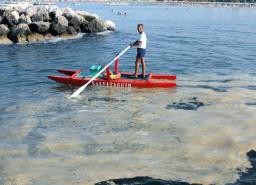The Mediterranean is turning into a 'sea of hell', Greenpeace says.
Climate change has filled the sea with alien species such as poisonous puffer fish while algae is coating the seabed with slime, the environmental organisation said.
But some experts said the picture painted by Greenpeace was alarmist.
''It's wrong to give in to alarmism,'' said Fabrizio Serena, head of the Livorno marine section of Tuscany's environmental protection agency ARPAT.
However, Serena stressed that it was ''important as never before'' to step up research into biodiversity and climate change to assess the Med's real state of health.
In its new report, Greenpeace said it had scientifically documented the emergency in the Med for the first time, showing how the waters are heating up, attracting species from warmer seas and altering the native fish stock.
''Until now we have only traced... individual alarms for the Mediterranean, but now we finally have the complete picture of what's happening in tourism and the environment,'' said Greenpeace's Alessandro Gianni, who compiled the dossier.
While the Med represents less than 1% of the world's oceans, it hosts between 5-15% of the marine species known to man, making it of strategic importance, Greenpeace said.
The organisation said the sea's deep waters were showing an annual temperature increase of 0.004 degrees, while surface waters and those along the coast were registering much greater increases.
''The average increase registered in the north-eastern basin is one degree in the last 30 years,'' the report said, while a heatwave in 2003 was the hottest event recorded underwater in the last 500 years.
The warmer waters are having consequences on fish as well as sponges and corals, according to the report.
Increasing water temperatures, rainfall variation and overfishing are among factors causing a drop in commercially important fish species such as anchovies, Greenpeace said.
The organisation said a fall in anchovy stocks in the Adriatic in the 1980s from 640,000 to 16,000 tonnes can largely be explained by climate change.
The warmer waters have also resulted in the colonisation of alien species arriving via Gibraltar and the Suez Canal over the last 15 years, including three species of puffer fish and two species of algae known to change seabed ecosystems.
Other species formerly restricted to some areas of the Mediterranean are now spreading across the sea, such as ornate wrasse from the Eastern Med whose range has crept 1,000 kilometres to the Tyrrhennian Sea as well as barracuda, previously found only in Sicily but now also swimming off Liguria.
Greenpeace warned that a drop in whale and dolphin populations between Tuscany, Liguria, Monaco and Corsica could also be linked to climate change.
The organisation said one of the best ways of helping to halt the Med's decline was the creation of a network of marine reserves, which must be made ''stronger and more resistant to the changes under way''.
''The Mediterranean sea is our insurance against an unforeseeable future that will be warmer, more arid and more hostile,'' Gianni said.
Last year a report by Italy's marine environment protection agency IRPA showed two alien species were now entering the Med each month, but that they were steering clear of marine reserves where native fish were holding out.













